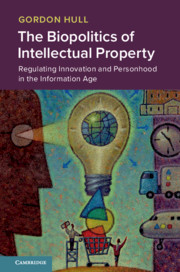 The Biopolitics of Intellectual Property
The Biopolitics of Intellectual Property Published online by Cambridge University Press: 01 November 2019
This chapter develops the theoretical framework for the book.Using Foucault, the chapter introduces three models of power: juridical (sovereignty and rights-based), public biopower (promoting the productivity and health of the population in a general way), and neoliberal biopower (same objective as biopower, but working on individuals and treating everything as part of the economy).With neoliberal biopower, the emphasis is on subjectification and the development of homo economicus as a type.I then trace intellectual property (IP) from its emergence at the intersection of classical liberalism and juridical power to the current neoliberal form.My focus is on the contrast between the early, public biopower version of IP with the current, neoliberal one.The earlier version relies on the notion of benefits to an amorphous public and worries about the effects of monopolies; the newer version drops the aversion to monopoly and attempts to use property rights to capture and internalize public benefits, while putting pressure on individuals in the public to view their interaction with culture economically.I then analyze the current, Demsetzian theorization of IP as neoliberal.
To save this book to your Kindle, first ensure no-reply@cambridge.org is added to your Approved Personal Document E-mail List under your Personal Document Settings on the Manage Your Content and Devices page of your Amazon account. Then enter the ‘name’ part of your Kindle email address below. Find out more about saving to your Kindle.
Note you can select to save to either the @free.kindle.com or @kindle.com variations. ‘@free.kindle.com’ emails are free but can only be saved to your device when it is connected to wi-fi. ‘@kindle.com’ emails can be delivered even when you are not connected to wi-fi, but note that service fees apply.
Find out more about the Kindle Personal Document Service.
To save content items to your account, please confirm that you agree to abide by our usage policies. If this is the first time you use this feature, you will be asked to authorise Cambridge Core to connect with your account. Find out more about saving content to Dropbox.
To save content items to your account, please confirm that you agree to abide by our usage policies. If this is the first time you use this feature, you will be asked to authorise Cambridge Core to connect with your account. Find out more about saving content to Google Drive.